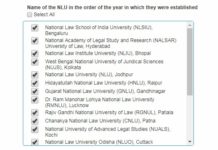This story has been submitted by Malvika P for the CLATGyan Blog Post Writing Competition. If you think this article is a good read, ‘Like’ this article on Facebook (the button is at the bottom of this piece) or post a comment using the ‘comments’ section below.
And I saw her every single day, her long, silver earrings glistening against her brown, slim neck. Wisps of soft grey ran through her hair. When she saw me, she’d break into the loveliest smile, a smile that would seep into the crevices that permeated her face, transcending the invisible boundaries that compartmentalized the different shades of humanity.
I waited for her every morning underneath the bus stand.
I didn’t know what her name was. I didn’t bother to ask. I didn’t need to.
She stood silhouetted, beautiful and alone, against the cool impersonality of the Bangalore streets, the lights, the clamour and the overpowering aroma of gulmohur.
Everyday we’d exchange shy smiles, and nothing more, she and I.
Once our fingers touched lightly, as they traversed the brightly hued BMTC bus timetable, and we exchanged a furtive, pleasantly surprised glance. We stood side by side underneath the bus stand every day, never uttering a word, but communicating as two kindred spirits do, the scent of jasmine wafting into my nostrils.
Our silence was almost sacrosanct. And when we caught our buses, hers first, and then mine, we’d go our separate ways, but the spell never broke.
Where she worked, her family, her education, all seemed inconsequential. And I fancied she felt the same way about me.
Why else would she never miss any of our trysts, why else would she finger the pallu of her pattu sari anxiously when I was late, and why else would she glance at me, throwing her head back ever so gently, after hoisting herself up the first step of the bus?
*****
It was a long week. Sakleshpur was moist, green and beautiful. My family and I went on vacation in July. The South West Monsoon pummeled the windows with feverish glee, painting a light haze over this rather nondescript hill station. And everyday I’d think of her, lying on the damp grass of the hills, by my side, her bangles tittering softly as we’d sit in silence.
*****
Shrapnel and blood and the musty, slightly salty stench of flesh. And those yellow metal things that the police used to cordon us off.
As if they could keep me out.
Bomb. Explodes. In. Sadashivnagar. Bus. Stand.
The words sounded so hollow. They couldn’t capture anything. Not the sense of profound relief that my family experienced. We had gone away at an opportune time, they said. What a narrow escape it had been.
Words couldn’t encapsulate the grief of the kith and kin of the dead.
Five dead. Many more injured.
She was dead.
Police whistles and police dogs and those swarming journalists.
My knees buckled, and I sank into the wet tar, the rivulets of dry blood winding their way for as long as I could see. A part of me had dissipated into nothingness, that wet, violent day in July.
*****
A few weeks later, a picture appeared in the first page of the newspaper. She had pretty eyes and wisps of grey running through her curly hair. It was her.
My heart gave a wild leap. Perhaps she was alive!
This time, I swore I’d hold her tight and keep her safe.
I stopped sipping my tea. My eyes skimmed over the title of the rather long article.
Identity of Suicide bomber Uncovered.
A fat tear ran down my cheek and fell onto the thin paper, right where her face was, the blot growing larger and larger.
I crumpled the paper and threw it into the waste bin. I washed my face.
Who was she?
A mere acquaintance. Not even that. We didn’t know each other. She was nothing to me. Just someone I once saw at the bus stop.















It’s beautiful! As usual. :’)
Haha. Thank you 🙂
It’s beautiful. So haunting. 🙂
Thank you 🙂
[…] And I Saw Her Every Single Day – by Malvika […]